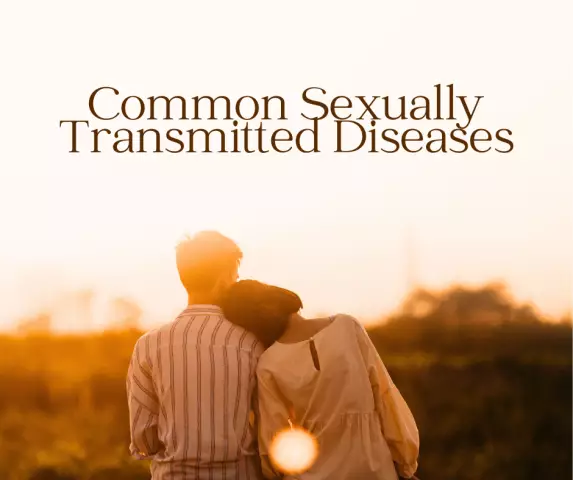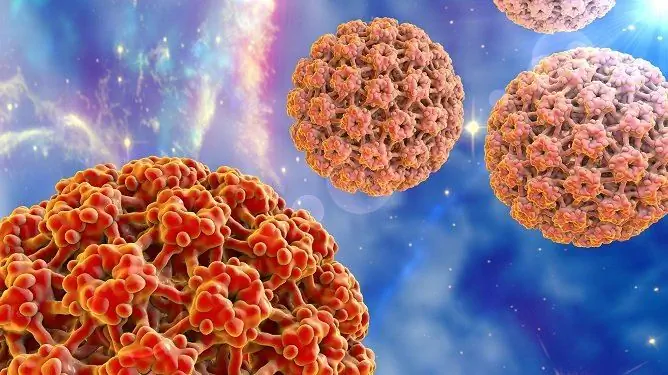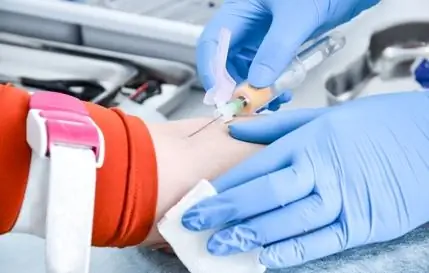- Author Rachel Wainwright wainwright@abchealthonline.com.
- Public 2023-12-15 07:39.
- Last modified 2025-11-02 20:14.
10 myths about sexually transmitted infections
To date, there are about 30 known sexually transmitted diseases (STDs, STIs). The prevailing attitude towards them in society contributes to the widespread occurrence of these ailments. On the one hand, people know very little about "shameful" diseases, and they do not seek to obtain detailed and reliable information, believing that such problems will never affect them personally. On the other hand, there are misconceptions about STIs, which instill in a person an unreasonable confidence that troubles of this kind cannot seriously harm his health. The result is usually a late appeal to specialists, complex and long-term treatment, infection of sexual partners.

Source: depositphotos.com
Sexual infections are not transmitted through unconventional sex
In fact, the risk of contracting an STI is greater with oral or anal sex than with vaginal sex. Unconventional sexual intercourse is associated with an increased likelihood of injury to the mucous membranes and the formation of microcracks on them. This provides pathogens with an additional opportunity to enter the bloodstream. In addition, when practicing exotic sex options, you can catch ailments such as, for example, proctitis, pharyngitis, chlamydial conjunctivitis.
Interrupted intercourse protects against infection
The causative agents of STDs live not only in semen, but also in the natural lubrication of the genitals, blood and other biological fluids. Therefore, interrupted contact with an infected partner does not guarantee a woman's safety. If the partner is sick, only a latex condom can protect the man.
All STDs have visible external manifestations
Many STDs in the initial stages do not reveal themselves at all. Their first signs may appear several months (or even years) after infection. In addition, some of the symptoms of such ailments can be easily confused with the manifestations of skin diseases or allergic reactions.
It is very common for people who become infected with STIs to be treated for diseases of another origin for some time. The only way to protect yourself from the negative consequences of accidental unprotected sex is to urgently contact a venereologist and pass the tests recommended by him.
A genital infection can be cured without the help of a doctor
This is a tenacious and extremely dangerous delusion, fraught with not only medical but also social consequences. It is imperative that everyone firmly grasp the following:
- an accurate diagnosis (STD) is made only on the basis of laboratory tests. Antibacterial and antiviral drugs intended for the treatment of such diseases are selectively active. Therefore, self-administration of medications selected for the external signs of an illness is likely to be useless;
- the doctor must carry out not only the appointment of treatment, but also control over its course and results. Self-activity in this matter carries the risk of infection of family members and sexual partners of the patient due to premature termination of medication;
- when prescribing therapy, the specialist must take into account the characteristics of the patient's condition, the presence of chronic ailments and other important nuances. It is impossible to do this without appropriate education and experience;
- there are no miraculous drugs that can instantly cope with any genital infection. Advertising of various dietary supplements, herbal preparations and similar means is nothing more than a marketing ploy by unscrupulous manufacturers. The use of these drugs will not bring the desired result and may be hazardous to health.
STIs can be caught in a public bath or swimming pool
This is not true. Most STI pathogens are extremely sensitive to environmental influences. They die quickly at elevated temperatures and in chlorinated water. That is why it is almost impossible to get infected in the pool or sauna.
The likelihood of contracting an STD depends on social status
Morbidity statistics indicate that the likelihood of contracting STIs has nothing to do with either a person's social status or the level of his income. People who belong to different social groups, but do not have regular sexual partners, are at almost the same risk.
Only personal care, awareness and commitment to traditional family values can provide real protection.
A latex condom does not always prevent infection
In combination with special barrier lubricants, the condom provides almost 100% protection against STIs, which cannot be said about other mechanical contraception: vaginal diaphragms, spirals and cervical caps are completely useless in this sense.
Birth control pills are effective against STIs
There are no drugs to prevent infection. Oral contraceptives do not have a similar effect. Most birth control pills alter a woman's hormones to prevent the maturation of eggs. This does not affect the possibility of infectious agents entering the body during intercourse.
Post-sex hygiene measures to protect against infection
This is a very harmful myth. A woman who followed the advice to wash off the causative agents of STDs by douching with warm water or a weak solution of potassium permanganate, with a high degree of probability, will simply help pathogenic microorganisms penetrate deeper into the genital tract. An attempt to use more aggressive solutions for such procedures will lead to burn damage to the mucous membranes. Moreover, the likelihood of infection will not decrease at all.
The widespread belief that a man can get rid of possible uninvited "guests" by urinating immediately after sexual contact is also unfounded. Such actions will not bring harm, but also benefit too.
People who are “tested frequently” are safe partners
Employees of children's and medical institutions, trade and catering are really required to periodically visit a venereologist and take tests for the absence of STDs. However, this by no means makes them safe partners. First, the intervals between checks are at least six months, and during this period, a person who leads a promiscuous sex life may contract STIs repeatedly. Secondly, the standard check includes tests for far from all genital infections: diseases such as chlamydia, mycoplasmosis, ureaplasmosis, genital herpes, cytomegalovirus and many others remain outside the scope of attention of physicians - and this is when a person is honestly examined without trying to get around the rules in any way. Therefore, the presence of a medical record does not necessarily indicate the absence of an STD.

Source: depositphotos.com
Sexually transmitted infections are extremely dangerous. They provoke the development of infertility (both female and male), damage to the nervous, cardiovascular and excretory systems, the musculoskeletal system, and even oncological diseases. The causative agents of these infections can penetrate the placental barrier, causing numerous fetal development disorders and contributing to the birth of children with severe congenital pathologies. In addition, the presence of any STD dramatically increases the risk of infection with the human immunodeficiency virus (HIV).
Most of these problems can be avoided. To do this, you just need to be as careful as possible in the choice of sexual partners, avoid unprotected sexual intercourse and immediately consult a doctor if suspicious symptoms appear.
YouTube video related to the article:

Maria Kulkes Medical journalist About the author
Education: First Moscow State Medical University named after I. M. Sechenov, specialty "General Medicine".
Found a mistake in the text? Select it and press Ctrl + Enter.






